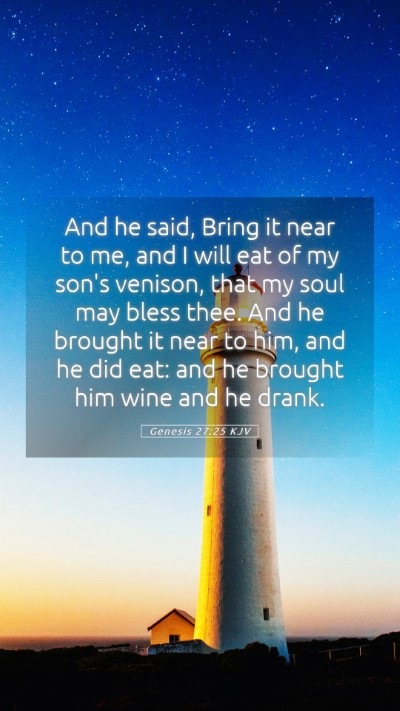Understanding Genesis 27:25
Genesis 27:25 states:
"And he said, Bring it near to me, and I will eat of my son’s venison, that my soul may bless thee. And he brought it near to him; and he did eat: and he brought him wine, and he drank."
This verse comes from a pivotal moment in the narrative of Jacob and Esau, highlighting themes of deception, family dynamics, and the quest for blessing. To fully grasp the meaning of this verse, we can draw from various public domain commentaries.
Bible Verse Commentary Overview
In this context, Genesis 27:25 serves to illustrate several key ideas:
- Deception and Identity: This verse is part of the larger story where Jacob, disguised as Esau, deceives his father Isaac to receive the blessing meant for his brother. Commentators like Matthew Henry emphasize the moral implications of this deception, discussing how it reflects human nature's tendency to manipulate and the complexities of familial relationships.
- Importance of the Blessing: The blessing Isaac is about to bestow carries significant weight. Albert Barnes points out that this blessing was not merely a declaration but a prophetic statement impacting the future of Jacob and Esau’s descendants.
- Cultural Context: Adam Clarke discusses the cultural significance of meals in ancient Biblical traditions, where sharing food often signified acceptance and blessing. Isaac’s request for the venison highlights the customs of his time, where food was closely tied to intimacy and favor.
In-Depth Analysis of the Verse
To delve deeper, let’s examine various elements surrounding Genesis 27:25:
1. The Role of Food
Food serves as a medium for connection and covenantal blessing in many Biblical narratives. Isaac's desire to eat before blessing Jacob emphasizes how vital this ritual was in Jewish culture. This foundational understanding can enhance our Bible study insights by showing the relational aspects of blessings.
2. Psychological and Emotional Dynamics
The emotional states of the characters involved add layers to the interpretation. Jacob's anxiety juxtaposed with Isaac’s blind trust provides a rich ground for understanding relational betrayal within families. Commentaries encourage a look at how fear and desire for parental approval drive actions.
3. Theological Implications
This event raises questions about divine will versus human action. Was Jacob justified in his deception to fulfill the promise made to Rebecca? Here, issues of predestination and free will come into play, making Genesis 27:25 a profound verse for theological discussion and understanding Scripture.
Cross References
Understanding Genesis 27:25 also involves examining related scriptures that enlighten its themes:
- Genesis 25:29-34 - The selling of Esau's birthright
- Genesis 27:1-4 - Isaac’s desire for a meal and blessing
- Hebrews 11:20 - Reference to Isaac’s blessings
Practical Applications
For modern readers, Genesis 27:25 offers various lessons:
- Moral Reflection: The ethical dilemmas faced in the story encourage us to reflect on the consequences of our actions, particularly when familial relationships are involved.
- Understanding Human Actions: Understanding the motivations behind Jacob’s actions can foster empathy in our own family dynamics.
- Valuing Blessings: This verse also challenges us to cherish and seek blessings in our lives, recognizing their impact on our journey.
Conclusion
Genesis 27:25 encapsulates a critical moment in Biblical history, serving as a foundation for discussions about morality, family, and divine favor. By engaging with various Bible study resources and interpretations, individuals can gain deeper Bible verse meanings and explanations, enriching their spiritual journey.
This exploration underlines the importance of contextual understanding and applying these verses in our daily lives, prompting both personal reflection and communal discussions in Bible study groups.


